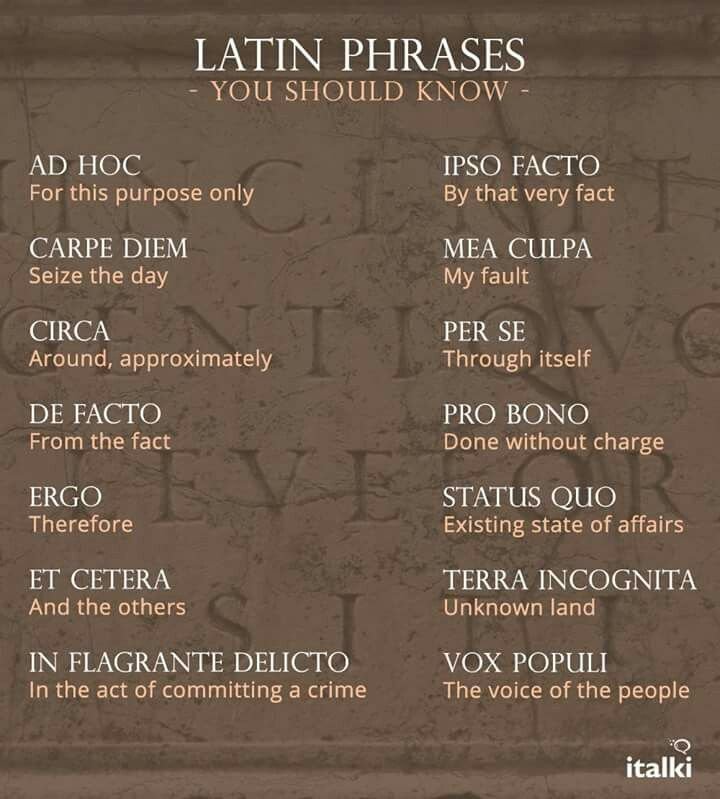It’s guaranteed that you have or will run into some of these Latin terms in anything including the lightest reading. That’s because they’re everywhere. In newspapers, textbooks, manuals, et cetera. They are used in, inter alia, academic writing, text messaging, and, quite extensively, law documents. So, they are, ipso facto, very important to know. Ergo, we thought it’s a good idea to combine these common Latin words and phrases in one place and explain what they mean so that when you run into some of them next time, you go like, ha! I have seen these Latin words in English somewhere and I know what they mean. So, let’s get down to it.
1. a priori
A belief or conclusion based on assumptions or reasoning of some sort rather than actual experience or empirical evidence. Before actually encountering, experiencing, or observing a fact.
2. a posteriori.
A fact, belief, or argument that is based on actual experience, experiment, or observation. After the fact.
3. ad astra.
To the stars.
4. ad hoc.
For a particular situation, without planning or consideration of some broader purpose or application.
5. ad hominem.
Directed to a particular person rather than generally, such as an attack on a person rather than a position they are espousing.
6. ad infinitum.
Repeat forever.
7. ad lib
Short for ad libitum. As you desire, at one’s pleasure. To speak or perform without preparation.
8. ad nauseam.
Repetition that has become annoying or tiresome.
9. affidavit.
He has sworn. Sworn statement.
10. alma mater.
Nourishing, kind, bounteous mother. School from which one graduated.
11. alias.
Also known as. Otherwise known as. Less commonly as the proper meaning of at another time, otherwise.
12. alibi.
In another place. Elsewhere. Reason one couldn’t have been in a location where an act was committed.
13. alter ego.
Other self. Another side of oneself.
14. A.D.
short for anno Domini. In the year of our Lord. Number of years since the birth of Jesus Christ.
15. a.m.
Short for ante meridiem. Before midday (noon.) Morning.
16. animus.
Spirit, mind, courage anger. Animosity. Intense opposition and ill will towards something, somebody, or some social group, commonly emotional, passionate, and mean-spirited. Hatred.
17. ante.
Before. Earlier. In a Supreme Court opinion, ante refers to an earlier page of the same opinion.
18. ante bellum.
Before the war.
19. ante mortem.
Before death.
20. bona fide.
Genuine. Real. With no intention to deceive.
21. c. / ca. / or cca.
Short for circa. Around. About. Approximately. Relative to a certain year.
22. carpe diem.
Seize the day or moment. Make the best of the present rather than delay or focus on the future.
23. caveat.
Warning, caution, disclaimer, or stipulation.
24. cf.
Short for confer. Compare to. In reference to, as a comparison.
25. cogito ergo sum.
I think, therefore I am — Descartes.
26. consensus.
Agreement. General or widespread agreement.
27. corpus.
Body, especially of written or textual matter such as books and papers.
28. curriculum.
Race. Course of a race. Path of a race. Subjects comprising a course of academic study.
29. CV
Short for curriculum vitae. The course of one’s life. Resume. List of significant academic and professional accomplishments, achievements, awards, education, and training.
30. de facto.
True or matter of fact as it is, regardless of intent, good reason, authority, or official reason for being such.
31. dictum.
Something said. Noteworthy, authoritative statement or principle. Common wisdom.
32. doctor.
Teacher. Learned person. Doctor.
33. ergo.
Therefore.
34. et al.
Short for et alia (neuter plural) or et alii (masculine plural) or et aliae (feminine plural). And others. And all of the others.
35. etc.
Short for et cetera.
36. e pluribus unum.
— Out of many, one — U.S. motto.
37. ex post.
After.
38. ex post facto.
After the fact.
39. e.g.
Short for exempli gratia. For the sake of example. For example.
40. ibid.
Short for ibidem or ib idem. In the same place. For a citation, indicates that it is from the same place as the preceding citation.
41. id.
short for idem. From the same source. For a citation, indicates that it is from the same source, but not from the same location in that source. In contrast to ibidem (ibid.) which means the same location or place in the same source as the preceding citation.
42. i.e.
Short for id est. That is. In other words.
43. in absentia.
Conducted in the absence of.
44. in camera.
In chambers. In private, commonly for legal proceedings, in the judge’s office (chambers.) before digital photography cameras were little “chambers.”
45. in situ.
In position. In place.
46. in toto.
As a whole. Entirely. All of it.
47. incognito.
Unknown. With one’s identity concealed. This is actually an Italian word, derived from the Latin word incognitus.
48. inter alia.
Among others. Among other things.
49. innuendo.
By nodding. Implied. Indirectly implied. Suggested. Oblique allusion.
50. intra.
Within. In a Supreme Court opinion, refers to a decision of another court, typically an appeals court.
51. ipso facto.
By that very fact or act. Therefore.
51. lingua franca.
Common language in a multi-language environment. Technically, it’s Italian.
52. magnum opus.
Great work. Greatest work. Masterpiece.
53. M.O.
short for modus operandi. Mode or method of operation. How you do things.
54. n.b. or N.B.
short for nota bene. Note well. It is worth noting that.
55. per capita.
Per person, for each person, of a population. Individually, but not for any particular person.
56. per cent.
or percent short for per centum. For each one hundred.
57. per se.
By itself. Intrinsically. Specifically.
58. p.m. / PM
short for post meridiem. After midday (noon.) Afternoon.
59. post.
After. Later. In a Supreme Court opinion, post refers to a later page of the same opinion.
60. post mortem.
After death.
61. prima facie.
On its face. Accepted on its face. Accepted as true based on initial impression. Accepted as true unless proven false.
62. PS.
short for post scriptum. Written after. After what has been written. In addition to what has been written. In addition.
63. quasi.
As if. As though. Resembling. Similar but not quite exactly the same. Having many but not all the features of.
64. quid pro quo.
This for that. An exchange of goods or services. A barter transaction. Any contractual transaction.
65. sic
or [sic]. So, this. The previous word should be taken literally even if it is not correct or appropriate.
66. stat.
or stat short for statim. Immediately. Now. without delay.
67. status quo.
The existing state of affairs. As it is. As things are.
68. stricto sensu
or sensu stricto. In a narrow, tight, or strict sense. Strictly speaking.
69. sui generis.
Of its own kind. Unique. Outside of existing categories. In law, outside of existing law.
70. supra.
Above. From the previous cited source.
71. tabula rasa.
Clean slate. Blank slate. Absence of any preconceived notions, ideas, goals, or purpose.
72. veni, vidi, vici.
I came, I saw, I conquered.
73. verbatim.
The same exact words. Literally.
74. vs.
short for versus. Against. In opposition to. As opposed to. In contrast to.
75. veto.
I forbid. Reject.
76. vice versa.
As well as the two immediately preceding subjects of a statement reversed. The same either way. The other way around.
77. viz.
short for videre licet or videlicet. Namely. That is.








These are just great. Keep going Nerds – you provide a great service. Thank you.
A question: given the presence of Latin in English why is it not considered a member of the Romance languages?
Correction:
Ad nauseum
This should be “ad nauseam”
OMG — Did you actually misspell “ad nauseam”? lol
Dear Nerds, pleae note the small spelling error: it should read „ad nauseam“.
Keep up the good work!
English branched out from Germanic languages picking up structures, phones, and other characteristics of the language group, though most vocabulary came from Latin and other romantic languages, it still is not considered one as changes came after when trades and globalisation happened and not originally from the English language.
You could include “stet”, meaning “let it stand”. It is a term used in editing, and means “disregard the correction that was made previously”.
The list is incomplete. You missed QED. Quod errat demonstrandum. It has been proved/shown;-)
Excellent keep up the good work Nerds
One r
Quod erat demonstratum
Best to write AM / PM in capital letters. (‘periods’ are out of fashion) and it’s harder to read.
a.m. / p.m. and quicker to type.